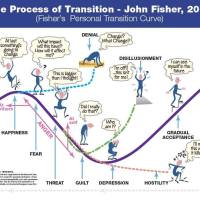Significant life transitions, such as moving to a new city or a new country, becoming a parent or retiring, can be exciting, exhilarating and giving you a chance to grow. Yet transitions, even positive ones, can also be stressful and bring up mixed feelings.

Breaking up with yourself is hard, yet necessary: In transitions, you’re breaking up with who you were during that time of your life. You’re not only leaving a place and a season in life behind, but you’re also leaving a version of you.
In life transitions, feeling strangely abnormal becomes the new normal.
So right now, if it feels like you’re going through an identity crisis it’s probably because you most definitely are.
The only way to truly own your life is to take responsibility for it. Sometimes things happen and there is no logical explanation, and it doesn’t need to be anyone’s fault. Finger-pointing and blaming doesn’t take away from what happened or change the facts. In fact, it keeps you living in the past by dwelling
Control, perfectionism, micro-managing. If it serves you, that’s great. Truth is I’ve yet to meet a woman that doesn’t drive herself crazy over it.
I refer to control as a ‘losing game’. It’s perfectly natural to desire that certain things happen in a certain way, but when we create requirements that everything happens according to plan (requirements to be happy, to feel successful, to feel good about ourselves), that’s when it backfires. And it’s only because we will never truly be able to control everything and everyone in our lives. It’s an impossibility. But we do have the power to influence ourselves and our lives to our greatest abilities.
Happiness stems from freedom, not control. But we can only feel truly free when we have the ability to choose. Restrictions and control are the polar opposite of freedom.
Breaking up with OLD_YOU starts with self-awareness.
Your inner self-talk determines what you say, what you do, and how you feel every single day. Influencing it is one of the most powerful things you can do to influence your life.
If you can identify when you are talking to yourself about yourself through the eyes of guilt, shame, blame, control, or comparison, and start talking to yourself like you would your own best friend (with acceptance, compassion, and understanding), your life is going to completely change.
Transitions never occurs in a vacuum. It Involves people at every turn.
Part of transitioning well means being mindful of the process involved in saying good-bye. If we give ourselves the time and space to say good-bye well we are freer at our destination to say hello with our whole hearts. Same principle applies when you have to say goodbye to your old self.












